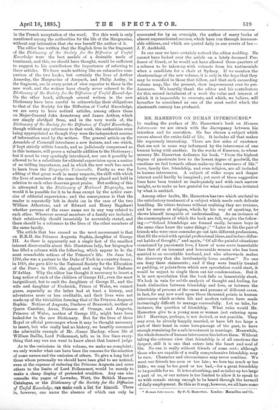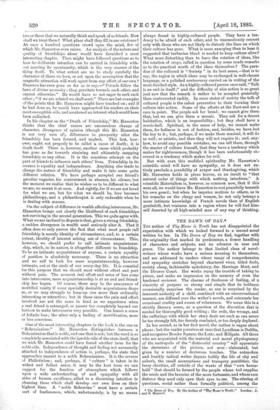MR. HAMERTON ON HUMAN INTERCOURSE.*
IN reading the preface of Mr. Hamerton's book on Human Intercourse we are struck with the discrepancy between his intention and its execution. He has chosen a subject which covers almost the entire field of life. It includes all that makes life supremely interesting. There are few sides of existence that are not in some way influenced by the intercourse of one human being' with another. In the words of Emerson, to whose memory Mr. Hamerton dedicates his book, " From the highest degree of passionate love to the lowest degree of goodwill, the emotions we feel towards others make-up the sweetness of life." Love, family ties, friendship, and even religion, are all included in human intercourse. A subject of wider scope and deeper interest could hardly be imagined ; yet most of these suggestive lines have been treated so inadequately and with such narrow insight, as to make us less grateful for what is said than irritated by what is omitted.
Among other faults, Mr. Hamerton has two which are fatal to the satisfactory treatment of a subject which needs such delicate handling. He utters truisms without realising they are truisms, and he sneers at religion, which, by his way of speaking, he shows himself incapable of understanding. As an instance of the commonplaces of which the hook are full, we give the following :—" School friendships are formed easily, because boys in the same class know the same things ;" " Later in life the pair of friends who were once comrades go out into different professions, that fill the mind with special professional ideas, and induce different habits of thought ;" and again, " Of all the painful situations occasioned by passionate love, I know of none more lamentable than that of an innocent and honourable woman who has been married to an unsuitable husband, and who afterviards makes the discovery that she inv'oluntarily loves another." No one can deny these statements ; and if they were frankly treated as padding, or points from which new speculation could start, it would be unjust to single them out for condemnation. But it is in new speculation that the book falls so lamentably short. We look in vain for subtle analysis of thought and feeling, for fresh distinction between friendship and love, or between the friendship of persons of the same and persons of different sexes, in fact, for any new word upon those thousand points in human intercourse which modern life and modern culture have made increasingly difficult to manage successfully. Let us take, for instance, the question of friendship. What rules would Mr. Hamerton give to a young man or woman just entering upon life P Marriage, perhaps, is not desired, or not possible. They may even be already happily married, or have left too large a part of their heart in some love-passage of the past, to have enough remaining for a safe investment in marriage. Meanwhile, the whole domain of human intercourse lies before them. Without taking the extreme view that friendship is of all emotions the deepest, still it is one that enters into the heart and soul of life. No one is really without friends of some sort; although those who are capable of a really comprehensive friendship may be rare. Character and circumstance may never combine. We meet our friends too soon or too late ; we love tgo much iv too little ; we may be too good or too bad,—for a great friendship to be possible for us. It is too absorbing, and so takes up too large a part of us, or our nature is too limited to allow it to speak to us with sounds strong enough to be heard through the turmoil of daily employment. Be this as it may, however, we all have some
two or three that we naturally think and speak of as friends. How shall we treat them ? What place shall they fill in our existence ? At once a hundred questions crowd upon the mind, few of which Mr. Hamerton even raises. An analysis of the nature and quality of friendships alone would have furnished a most interesting chapter. Then might have followed questions as to how far deliberate intention can be carried in friendship without marring its spontaneity, which is the very essence of the thing itself. To what extent are we to study carefully the character of those we love, or act upon the assumption that the magnetic attraction will work apart from any effort of our own ? Emerson has even gone so far as to say,—" Friends follow the laws of divine necessity ; they gravitate towards each other, and cannot otherwise." He would have us not eager to seek each other ; " if we are related we shall meet." These are but examples of the points that Mr. Hamerton might have touched on ; and if he had done so, he would have approached his readers on their most susceptible side, and awakened an interest which would have been unlimited.
In his chapter on the "Death of Friendship," Mr. Hamerton thinks that the chief causes are unconscious change of character, divergence of opinion (though this Mr. Hamerton is not very sure of), differences in prosperity after the friendship has been formed, and neglect. This last, however, ought not properly to be called a cause of death ; it is death itself. There is, however, another cause which probably has gone as far towards straining and ultimately snapping friendship as any other. It is the conscious attempt on the part of friends to influence each others' lives. Friendship in its essence is equality and independence. Anything else tends to change the nature of friendship and make it into some quite different relation. We have perhaps accepted our friend's peculiar vagaries, his contentment in absence, his silence, but the moment we realise that he wishes us to be different to what we are, we resent it at once. And rightly, for if we are not loved for what we are, but for what we should be, love becomes philanthropy, and a philanthropist is only endurable when he is dealing with masses.
On the subject of difference in wealth affecting intercourse, Mr. Hamerton brings out clearly the likelihood of such friendships not surviving in the second generation. This we quite agree with. What we are inclined to dispute is that, given a strong friendship, a sudden divergence in wealth need seriously alter it. That it often does so only proves the fact that what most people call friendship is merely identity of circumstance, and, to a certain extent, identity of interest arising out of circumstance. This, however, we should prefer to call intimate acquaintanceship, which, in its nature, is altogether different to friendship. To be an intimate acquaintance of anyone, a certain equality of position is absolutely necessary. There is no attraction and no call to look for mere acquaintanceship, however intimate, out of the circle of our every-day life. It is essential for this purpose that we should meet without effort and part without pain. The moment real effort and sense of loss come into intercourse, mere acquaintanceship is at an end and friendship has begun. Of course, there may be the annoyance of mortified vanity if some specially desirable acquaintance drops us, or we may struggle to keep-up one more than ordinarily interesting or attractive ; but in these cases the pain and effort involved are not the same in kind as we experience when a real friend is estranged, or passes too completely beyond our horizon to make intercourse very possible. One leaves a sense of definite loss ; the other only a feeling of mortification, more or less conscious.
One of the most interesting chapters in the book is the one on " Bohemianism." Mr. Hamerton distinguishes between a Bohemianism that is noble, and one that is not; but the word is so completely associated with the ignoble side of the state itself, that we wish Mr. Hamerton could have found another term for the noble side. Independence of thought and feeling not necessarily attached to independence of action is, perhaps, the state that approaches nearest to a noble Bohemianism. It is the reverse of Philistinism ; and, perhaps, if " culture " is taken in its widest and fullest sense, it may be the best term we can. suggest for the freedom of atmosphere which follows upon a wide understanding of and sympathy with all sides of human excellence, allied to a discerning intuition in choosing those which shall develop our own lives on their highest lines. A " noble Bohemian " must have a certain sort of fearlessness, which, unfortunately, is by no means
always found in highly-cultured people. They have a tendency to be afraid of each other, and to unconsciously consort only with those who are not likely to disturb the lines on which their culture has gone. What is more annoying than to hear it suggested that barbarian blood is needed to keep culture alive P What more disturbing than to have the rotation of ideas, like the rotation of crops, called in question by some crude remarks as to the practical worth of the ideas themselves P The paradise of the cultured is " Society " in its best sense,—that is to say, the region in which ideas may be exchanged in well-chosen language, or a polished controversy carried on in writing of the most finished style. As a highly-cultured person once said, "Talk is an end in itself ;" and the difficulty of wise action is so great just now that the remark is rather to be accepted gratefully than controverted rashly. In some states of society the talk of cultured people is the safest preventive to their turning their culture into action. Some of the efforts at the East-end are a case in point. The people ask for bread ; we cannot give them that, but we can give them a mosaic. They ask for a decent habitation, which is an impossibility ; but they shall have a music-hall. Spiritual, in the sense of holy, we cannot make them, for holiness is out of fashion, and, besides, we have lost the key to it ; but, perhaps, if we make them musical, it will do as well; or artistic, and then they will not require it ; and, anyhow, to avoid any possible mistakes, we can tell them, through the master of culture himself, that they have a tendency which makes for righteousness, though it has been unfortunately obscured in a tendency which makes for evil.
But with even this modified spirituality Mr. Hamerton's scientific mind will have no sympathy, as it does not entirely preclude a possibility of prayer and thanksgiving, which Mr. Hamerton holds in pious horror, as an insult to "that natural order of things with which nothing interferes." A scientific Materialism is, however, so common now, that if this were all, we would leave Mr. Hamerton to rest peacefully beneath his own gourd ; but when he imputes motives to others, as in his remarks on the clergy and women, he not only betrays a more intimate knowledge of French novels than of English gentlefolk, but ventures into a region where he will find himself deserted by all high-minded men of any way of thinking.



































 Previous page
Previous page